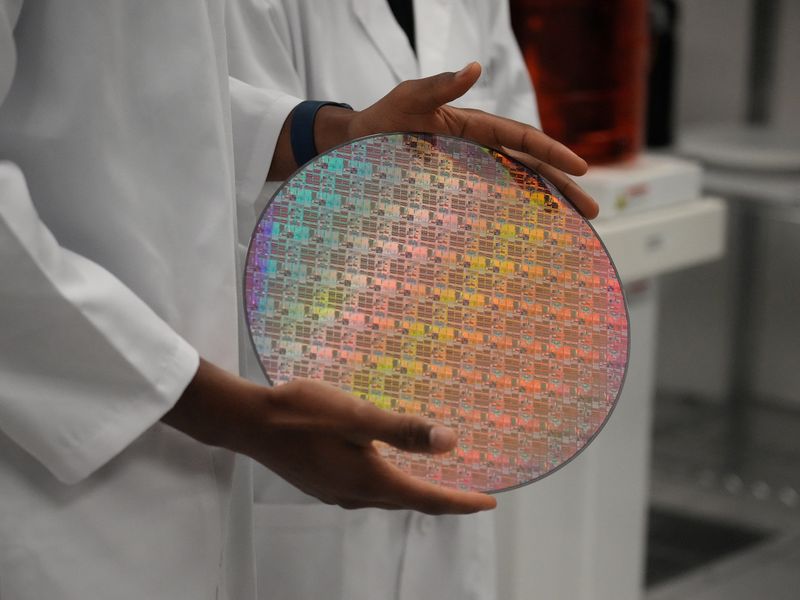By Stephen Nellis and Max A. Cherney
SAN FRANCISCO (Reuters) - U.S. officials have earmarked close to $30 billion in subsidies for advanced semiconductor manufacturing, aiming to bring cutting-edge artificial-intelligence chip development and manufacturing to American soil.
But with money set to start flowing in the next few weeks, accomplishing that goal is far from certain, industry experts say. The Biden administration must weigh how much taxpayer money to allocate among Taiwan Semiconductor Manufacturing, a powerful foreign leader, and Intel, a beleaguered homegrown company whose turnaround efforts remain promising but untested.
Betting on AI chips is also challenging in the rapidly evolving industry. Handing out subsidies today to the likes of Intel (NASDAQ:INTC), TSMC or Samsung Electronics (KS:005930), which is also vying for federal dollars and is the only other firm in the world that can make advanced chips, does not guarantee security in the AI landscape of the future.
"AI itself is moving so quickly, if you focus on today's AI chips, maybe two years from now it's a whole different thing," said Jay Goldberg, chief executive of D2D Advisory, a finance and strategy consulting firm. "As opposed to the (general) road map of advanced chipmaking which we know pretty clearly for the next decade."
The money will come from the U.S. CHIPS Act, which passed in 2022. Intel, TSMC and Samsung are all building factories in the U.S. and are all likely to receive some degree of U.S. subsidies. The main question is how U.S. officials allocate the money to meet the goal of bolstering AI chip production.
"We don’t manufacture or package any of the leading-edge AI chips needed to fuel the innovation ecosystem and power our most critical defense systems," U.S. Commerce Secretary Gina Raimondo said in a speech last month. "We cannot build the next generation of technological leadership on such a shaky foundation."
The Commerce Department declined to comment.
MADE IN TAIWAN
TSMC, the global leader in making AI chips, has yet to commit to bringing its most advanced technology to the United States.
At the moment, TSMC manufactures chips for Nvidia (NASDAQ:NVDA), Advanced Micro Devices (NASDAQ:AMD), Microsoft (NASDAQ:MSFT) and Alphabet (NASDAQ:GOOGL)'s Google in Taiwan. The company is not expected to bring its advanced 3-nanometer manufacturing, which is already used to make iPhone 15 Pro chips, to Arizona until at 2027 or 2028, despite starting mass production in Taiwan last year. It has not disclosed any plans to bring 2-nanometer technology, which will start production next year in Taiwan, to the U.S.
A TSMC spokesperson said the company has made "steady progress in productive ongoing discussions with the U.S. government on inventive funding" and its first factory in the U.S. "will enable the leadership in the 5G and artificial intelligence era for decades."
TSMC rival Samsung has a factory in Taylor, Texas, under construction that is expected to deploy the company's most advanced manufacturing technology. But according to analysts and industry sources, Samsung has long struggled to manufacture enough functional chips on each silicon wafer to make high- volume manufacturing profitable.
In an emailed statement, Samsung referred Reuters to its fourth-quarter earnings call, where executives said its advanced manufacturing processes are mass-producing chips, and that orders for its AI accelerator chips are increasing.
That leaves Intel, which has said it will carry out its most cutting-edge manufacturing processes - called "18A" and "14A" - in the U.S. But it has not publicly disclosed any major customers who plan to use the technology to make AI chips.
Allocating a large chunk of CHIPS Act funding to Intel, which many analysts expect the U.S. government to do, is essentially a bet on Intel's turnaround plan that CEO Pat Gelsinger announced in early 2021 after taking over.
Intel offers some advantages. AI chips are increasingly made up of smaller "chiplets" that must be packaged together, and Intel says it can combine chips made in its own factories with others fabricated by rivals such as TSMC.
"Their bias is that they're going to be the (manufacturer) of choice for these crazy complex systems of chips. And they're going to do that in the United States," said Ben Bajarin, chief executive of analyst firm Creative Strategies.
But to become an AI chip powerhouse, Intel has the difficult task of retaking the manufacturing lead from TSMC. Then it must transform its business to a service-oriented contract manufacturer for outside customers.
While recently unveiled Intel manufacturing technology looks promising on paper, the reality is that almost every advanced AI chip currently on the market is made by TSMC.

"The biggest issue they have is to execute," Dan Hutcheson, vice chair at analyst firm TechInsights, said of Intel. "The whole foundry business is a good year or two away before they either make it or break it."
An Intel spokesperson said in a statement that the company is on track with its "18A" process, which it expects to be "manufacturing-ready" in the second half of the year.